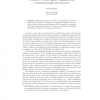Free Online Productivity Tools
i2Speak
i2Symbol
i2OCR
iTex2Img
iWeb2Print
iWeb2Shot
i2Type
iPdf2Split
iPdf2Merge
i2Bopomofo
i2Arabic
i2Style
i2Image
i2PDF
iLatex2Rtf
Sci2ools
122
Voted
ESAW
2009
Springer
2009
Springer
Normative Multi-Agent Organizations
Multi-agent systems are viewed as consisting of individual agents whose behaviors are regulated by organization artifacts. This abstract presents a programming language, which is designed to implement norm-based organization artifacts, by means of an example and explains the execution behavior of the language interpreter. In order to achieve the overall objectives of multi-agent systems, the behavior of individual agents and their interactions should be regulated/coordinated. Existing approaches advocate the use of organizational models, normative systems, and electronic institutions to regulate the agents’ behaviors and interactions [3, 4, 6]. Norm-based artifacts regulate the behavior of individual agents in terms of norms being enforced by monitoring, regimenting and sanctioning mechanisms. Generally speaking, the social and normative perspective is conceived as a way to make the development and maintenance of multi-agent systems easier to manage, e.g., OperA [2], AMELI [3], and M...
Related Content
| Added | 26 May 2010 |
| Updated | 26 May 2010 |
| Type | Conference |
| Year | 2009 |
| Where | ESAW |
| Authors | Mehdi Dastani |
Comments (0)

